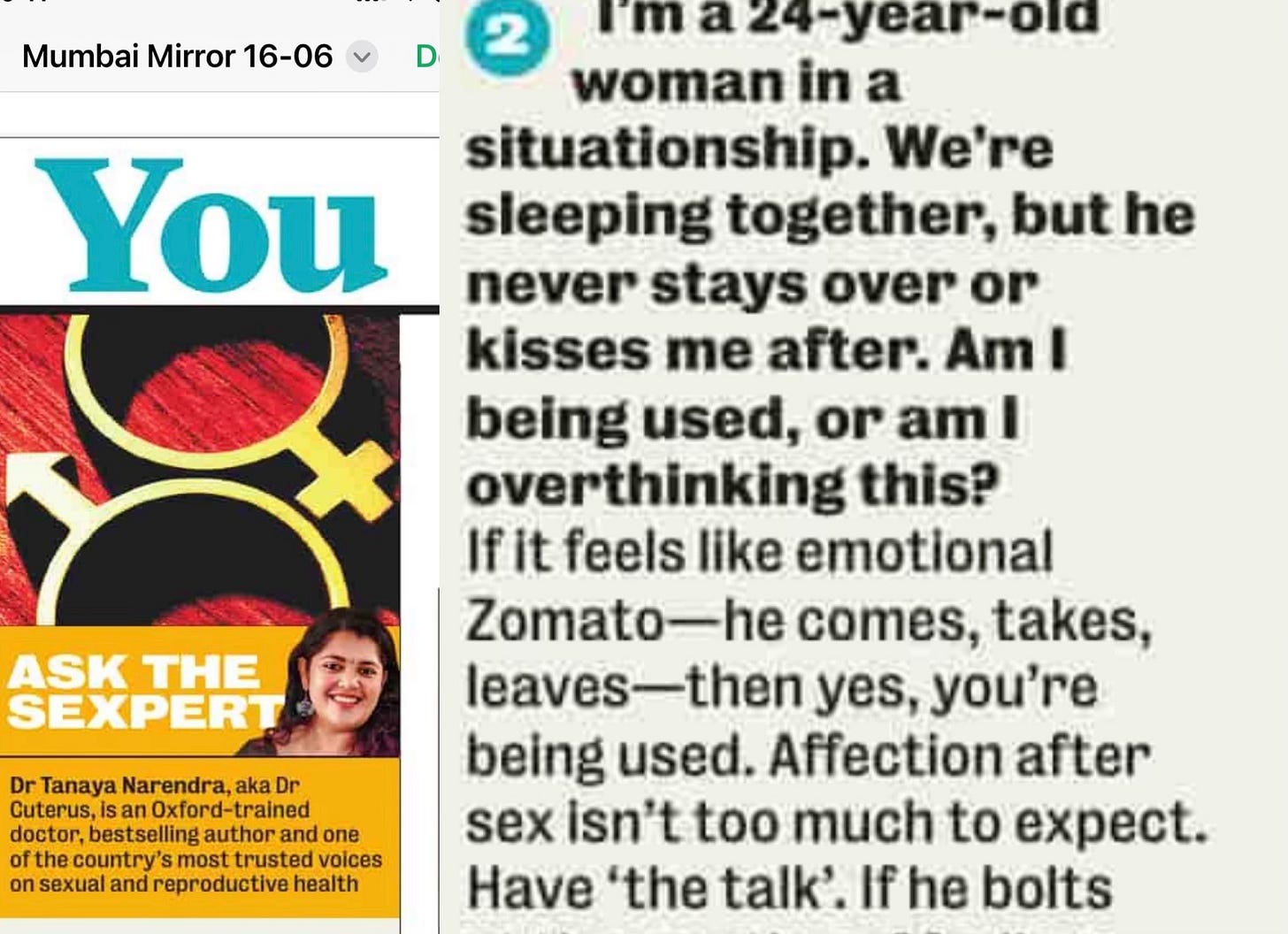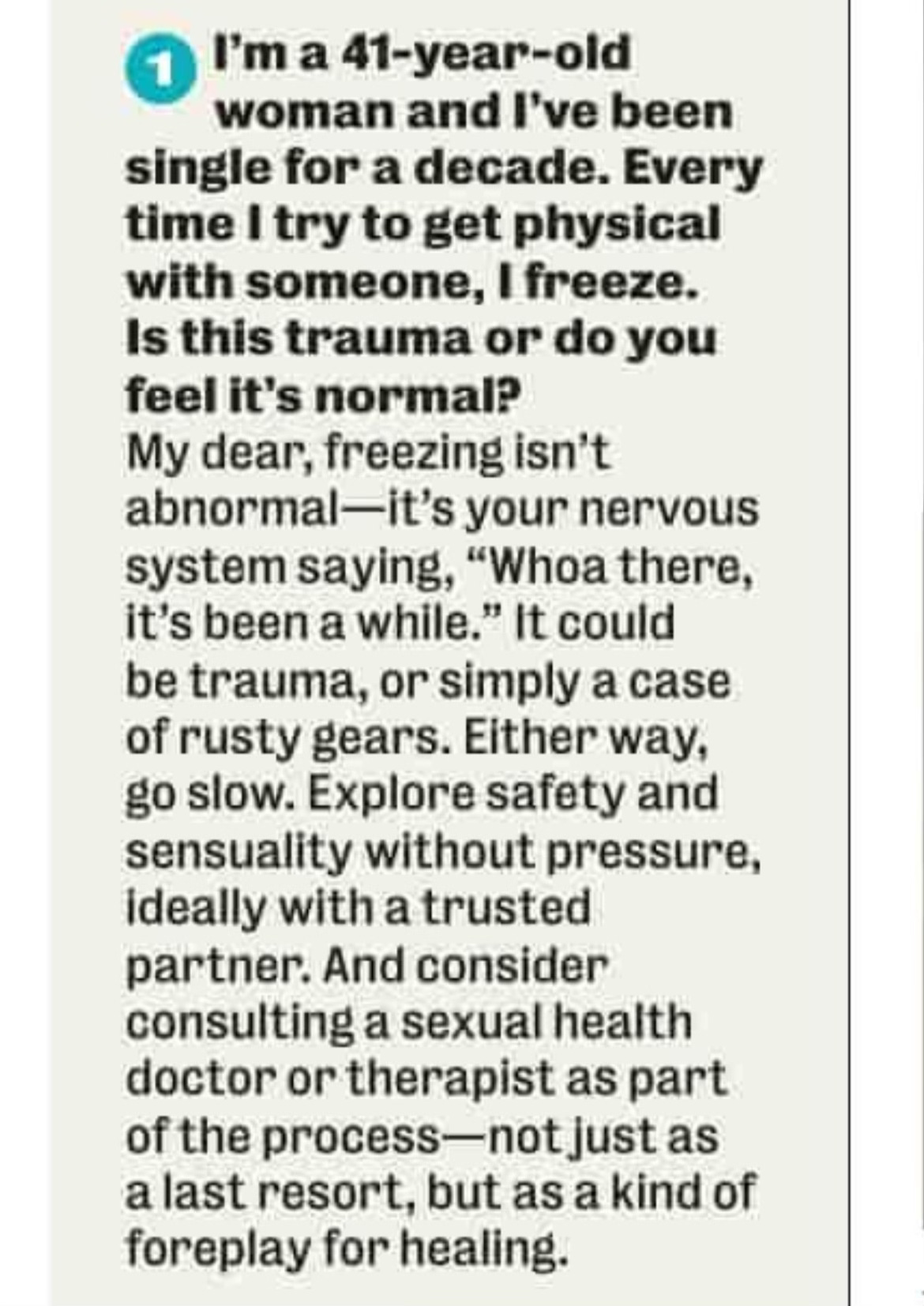Mumbai Mirror: The Case of The Missing Edit Page
Plus: a new favourite sex gyaani replaces an old favourite
Twenty years after it was first launched and five years after it was discontinued, the Times Group has suddenly rediscovered its love for print and relaunched Mumbai Mirror. I’m convinced it has something to do with bundling advertising across brands for more money but the suits say it’s going to be a “bolder, edgier” (lol) avatar. The advertisement announcing the return promises “fearless reporting”. This promise is illustrated with chai glasses (Freudian slip, perhaps?)
The press release issued to announce the relaunch, in classic Bennet, Coleman & Co style, quotes three suits and zero editorial team members. But here’s what I know:
The new editor is Krishnakumar Padmanabhan who was part of the Mirror team ages ago before he moved to Midday. He is NOT on social media (maybe the best strategy if you ask me). I’ve never met him, but I wish him the best in this new endeavour.
The team is much leaner than it was in 2020. Some of them are old hands at Mirror who have returned from Midday.
If you’re a TOI subscriber, I think you can choose Economic Times or Mirror with your TOI subscription.
Mirror now has an in-house AI programme that allows reporters to access archived stories from TOI as they write their stories. I think that’s a great idea, though I’ve also heard a rumour that the editorial desk has been replaced with AI.
Most importantly, the “bolder, edgier” avatar of Mirror has NO EDIT PAGE. So no Radhika Ramaseshan pointing out that a “bullet train holds the same thrill for Narendra Modi as a prefabricated and battery-operated Rare Aerotrain from Japan would for a child”. And no Dushyant, who will critique the judiciary, tell you bluntly what patriotism actually means, spotlight Islamophobia or our torturous tricks with domestic workers and poke you until you understand how the government mishandled the pandemic.
Instead, there is a WaPo page which carries light stories (protesting over-tourism with water pistols and effects of cigarette smoking kind of stuff) from The Washington Post and two personal finance pages. The rest of the paper looks the same—a diary page, city pages etc. The only columnist who wrote for the old Mirror and is now writing for the new Mirror from what I can tell, is Vivek Kaul.
Anyway, the reason I wrote this entire substack was not to give you journalism gossip but to reshare my piece on my all-time favourite from Mumbai Mirror—Dr Mahinder Watsa (I’ve attached it to the bottom of this substack). In his 90s he was gently chastising Indian men with pearls such as, “Some blissfully think they have entered the vagina until their wife tells them otherwise; actually, they were having intercourse between the thighs.”
He was everyone’s favourite because of his insane humour.
Q: What part of a woman’s body should I kiss or caress first to get her excited? A: Next you will ask me to accompany you on a date. Kiss wherever she allows you to.
Watsa died the same year Mirror’s reign as one of India’s leading newspapers ended.
The new Mirror has a new sexpert!
Dr Cuterus, as she calls herself on Instagram is Dr Tanaya Narendra who talks about sexual and reproductive health. She’s fun and zany on Instagram and I think she’s a good pick to fill the coolest 90+ man’s shoes. I really want her to be as popular as Watsa. Let’s all wish her lots of luck. If her first round of answers are any indication, she’s off to a flying start. Here’s her take on “foreplay for healing”.
And here’s my piece on Watsa. The link to it is here
His feminist theory of sex
He emphasizes mutual consent. He routinely tells women they have a right to enjoy sex. He believes that most sexual problems in women are caused by men. He points out that medical termination is legal for up to 20 weeks of pregnancy and that it’s worthwhile to cut your losses when you’re in a bad marriage. When he talks about infertility, he adds, seemingly casually: “It’s worth noting here that it is the male who is responsible for the sex of the child.” In a country where women are blamed for not delivering a male heir, this man knows it’s a point worth underlining.
About our abysmal ignorance of the anatomy of our partners, he notes: “Some blissfully think they have entered the vagina until their wife tells them otherwise; actually, they were having intercourse between the thighs.”
Most people love sexuality counsellor and columnist Mahinder Watsa, 91, for his legendary sense of humour.
Q: What part of a woman’s body should I kiss or caress first to get her excited? A: Next you will ask me to accompany you on a date. Kiss wherever she allows you to.
I think he’s the most useful feminist we’ve seen in modern India. He may not be a fixture at candlelight marches but he’s spent the last five decades helping Indian men be better in the bedroom and outside it. What a monumental task.
As a columnist with various publications for 50 years, Watsa has answered at least 40,000 questions (a conservative estimate, he says, when we chat on the phone) about our sex lives. As a consultant for the Family Planning Association of India in the 1980s, he established reproductive and sexual health centres in many Indian cities. His ongoing, popular sex column in Mumbai Mirror and its various editions has attained cult status in recent years. Even women write to him now.
To a woman who wants to know how to deal with a husband who wants sex very frequently he says: “You might like to tell him, ‘Help make it as enjoyable for me as it is for you or improve the quality and I’ll improve the quantity.’….”
To one who says her husband is gay and she can’t leave him because she comes from a “typical Indian family”, he replies: “There is no shame in standing on your own feet. It is your decision to either continue in this marriage… or choose a way out.” I wish more Indian women got this advice.
Maybe now they will. Watsa’s just out book, titled It’s Normal! (Penguin, ₹250) is set to be every Indian’s go-to sex and relationship manual. For a country that has always been overwhelmed by the Kama Sutra, Watsa’s sex manual is a good starting point.
Watsa tells me his book will definitely help people who are about to get married. “Many of them enter marriage with half-baked knowledge,” he says. He knows this because married people ask him everything from the meaning of oral sex to whether certain innocuous foreplay moves (best not detailed here) can cause nerve damage.
The book’s title suggests that we are clearly a nation that spends a lot of time worrying that our middle-of-the-road fantasies and sexual fetishes are horribly perverted. We are certainly not the norm but the reason for that is quite the opposite of the one we worry about: We still believe that kissing leads to pregnancy.
It’s an indicator of our sexual IQ that Watsa begins his book by answering that omnipotent question: Am I normal? His top criteria for “normal sex” is consent.
His frequent emphasis on consent is so predictable (and comforting) that readers are aghast when he doesn’t deliver what they expect. Watsa is still reeling from the criticism around one recent response. A couple who wasn’t able to conceive visited a holy man who gave them a medicine and asked them to stay in his ashram for two days. After that visit, the wife got pregnant. The husband was convinced the holy man had drugged them and had sex with both of them. The child looked exactly like the holy man, the letter writer said, and asked Watsa whether he should file a case. Watsa’s advice was to forget about the holy man and accept the good fortune of having a child. Why get entangled in a lengthy and expensive court battle, he argued.
What do you think, he asks when we chat. It’s obvious why you were criticized, I say. But he doesn’t need me to tell him that. When you’re spending 3-5 minutes a question and answering 65 or 70 of them every day, you’re bound to err occasionally. Watsa’s usually spot-on answers more than make up for these blips.
Watsa, who started his career as an obstetrician and gynaecologist, is an anomaly in a country where gynaecologists raise their eyebrows when unmarried women visit them. Some of his opinions may be old- fashioned (he’s not a big fan of premarital sex; he also believes you shouldn’t use the word old-fashioned to describe someone who would rather not have sex before marriage) but he is never judgemental. I suspect his views on premarital sex are tempered by the fact that lots of teenagers read him. “I ask them where do you have the privacy or space to have sex,” he says over the phone. On the terraces of high-rise apartments under the water tanks, they reply.
Old-fashioned or not, Watsa’s on the right side of every debate, including one about The Big V.
A gent wants to know how he can ascertain whether or not his bride-to-be is a virgin. “I suggest you don’t get married,” replies Watsa. “Unless you appoint detectives, there’s no way to find out. Spare her your suspicious mind.”
And fans of his sense of humour should know, Watsa doesn’t think he’s particularly funny. It’s probably just that medical school canteen banter that stayed with me, he tells me. I wish more Indian men could banter like him.






This is brilliant. And looks like from Dr Vatsa's time to mine quality of medical college banter deteriorated. The word CONSENT must be written in GOLD & BOLD perhaps even under water tanks. Great read Priya.
Brill! Chuckle!